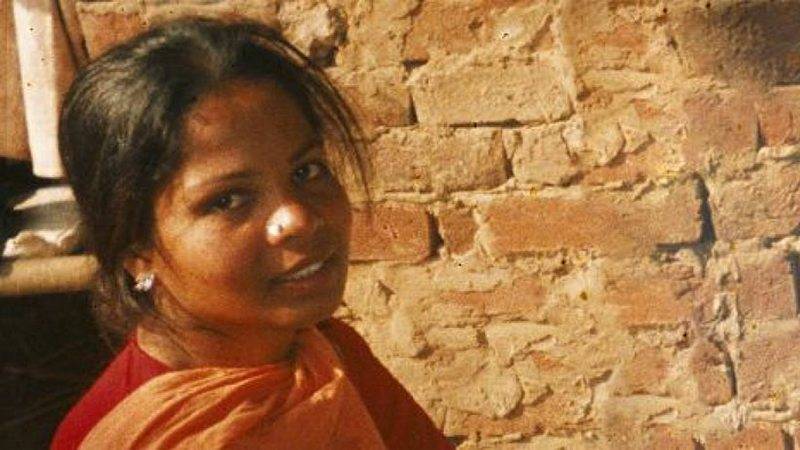
Asia Bibi and Ashiq Masih’s was the only Christian home in the village; prior to her incarceration through a blasphemy allegation, Asia Bibi’s coworkers and neighbours had been pressurizing her to convert to Islam. We had already failed Asia bibi though, long before the pressure mounted, before her imprisonment, and long before she was awarded death by hanging by our courts.
Asia Bibi was a child of poverty, a field hand, a farmhand, a little girl growing up in a country that is anti-woman, anti-poor, and anti-minority, we started to take pieces from her from the moment she was born.
In the surrounds of Lahore there are green fields, lush and punctuated with lines of trees marking the grid edges of plantation. Closer to the towns, there are plumes of smoke from factories and brick kilns where a pall hangs over the sky. The land and the kilns have claimed Asia Bibi’s entire family, though they have had none of the spoils. A life of toil, edged with dreams that are so small that anywhere else they would count as rights.
It was 9 years ago that Asia Bibi was employed to see in the falsa harvest, to pick the fruit by hand with other women from her village. The falsa tree bears fruit for three weeks only each year, a few feet high the tree, its purple berry yields best to small hands and nimble fingers, and labour is measured by the weight of the fruit gathered.
It was during the falsa harvest 9 years ago in a field near Nankana Sahib that Asia Bibi stopped to drink water from a cup left near a well. The dispute began over the right of a non Muslim woman to drink from a well where Muslims drank too, over that which is clean and that which is unclean; the dispute may have started earlier in the village of Ittan Wali itself, over a shared property boundary and the ownership of a morsel of a roof and the extent of its edge.
The Muslim women, Asia Bibi’s neighbours, who she had grown up with, played with, lived with, conjoined by poverty, her own sisters in every way possible save one, accused her of insulting the Prophet Mohammed. The issue drifted from water drunk to words spoken. A local cleric was informed and later that night a mob evolved from the mosque, which gathering villagers in its wake, surrounded Asia Bibi's house and beat her, her husband and her children. She might have died then, her blood, her children’s blood taken once and for all in one go for the soil of the Punjab and its yield.
Also read: Chief Justice Saqib Nisar's arguments for Asia Bibi's acquittal
Imprisoned at the time to save her life, a year later Asia Bibi was convicted to death by a Sheikhupura judge under the anti-blasphemy law, Section 295 C of the Pakistan Penal Code. The verdict was announced to a euphoric crowd chanting ‘kill her, kill her, Allahu Akbar, vengeance for the Holy Prophet, Allah is Great’. She says she was thrown like an old rubbish sack into a van. She cried she says, head in hands blocking sight but not sound. The judge was given a standing ovation.
Asia Bibi spent the next 9 years in solitary confinement in an 8ft by 10ft cell without windows in a prison in Lahore, protected temporarily by a moratorium on the death penalty. Outside the walls, the Governor of the Punjab was murdered for defending her right to life, the murderer was hanged, a shrine grew around his grave and followers grew around the shrine. Outside her cell Asia Bibi’s name grew and that of the man who committed murder in defense of the Prophet’s honour.
Inside 9 years passed with Asia Bibi confined in walls where no time passes, where there is no daylight and only artificial dark, where there is no voice to break the silence, no touch of a human hand. Did Asia Bibi loose count, did she die then? Did her body separate from her soul and her mind withdraw? Was the opening and shutting of the cell door, the wedge of sudden light the totality of her dreaming now? did she ebb away altogether, did she cease to feel her body? Was she only memory, or did her memory also fade. Each time the appeals came, was the air outside painful. Did she hear, did she see, could she imagine her children grown. She as a mother, what sustained her, what did she fear? Did she fear still, their hunger?
I imagine a woman with a thin chador on her head, maroon printed with an edge of green, a face prematurely aged from sun and labour, a little too thin. I imagine rows of falsa trees, dappled shade, the feel of a cup, warm to the touch, I imagine children at home, and voices, a small room with bundles of bedding too few for so many. They are faceless but the youngest is five. I do not know where Asia Bibi is today but I know her well. I have taken pieces of Asia Bibi from the day that she was born.
